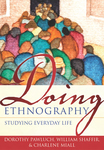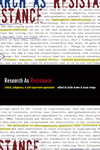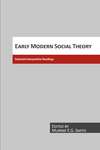We don’t actively support Internet Explorer
It appears that you are using Internet Explorer, which has been discontinued by Microsoft. Support has ended for versions older than 11, and as a result you may face security issues and other problems when using it.
We recommend upgrading to a newer browser such as Firefox, Google Chrome, or Edge for a much better experience across the web.
While this site may work with Explorer, we are not testing and verifying it, so you may run into some trouble or strange looking things.
Critical Strategies for Social Research
Edited by William K. Carroll
Overview
Edited by Canadian sociologist William K. Carroll, this thought-provoking volume is designed for research methods courses in sociology and social sciences. Critical Strategies for Social Research explores ways in which several key research strategies bring an emancipatory dimension to social analysis. The new approaches recognize that social analysis is a form of knowledge production that takes place in a human-constructed world marked by injustice and persistent inequality.
Carroll considers five influential and productive strategies of inquiry:
- Dialectical Social Analysis
- Institutional Ethnography
- Participatory Action Research
- Critical Discourse Analysis
- Social Inquiry as Communicative Reason
Table of Contents
Preface
Introduction
PART 1: KNOWLEDGE, POWER, AND SOCIAL RESEARCH
Part 1A: Rediscovering the Critical Edge in Social Analysis
Chapter 1 Theses on Feuerbach, Karl Marx
Chapter 2 Whose Side Are We On?, Howard S. Becker
Chapter 3 Social Justice and Sociology: Agendas for the Twenty-First Century, Joe R. Feagin
Part 1B: Steps toward Critical Inquiry
Chapter 4 On Intellectual Craftsmanship, C. Wright Mills
Chapter 5 Methods from the Margins, Sandra Kirby and Kate McKenna
Chapter 6 Twenty-Five Indigenous Projects, Linda Tuhiwai Smith
Chapter 7 Toward an Emancipatory Methodology for Peace Research, Abigail Fuller
PART 2: FIVE CRITICAL RESEARCH STRATEGIES
Part 2A: Making Connections, Unmasking Relations: Dialectical Social Analysis
Chapter 8 Getting Started on Social Analysis in Canada, Jamie Swift, Jacqueline M. Davies, Robert G. Clarke, and Michael S.J. Czerny
Chapter 9 The Principles of Dialectics, David Harvey
Chapter 10 Why Dialectics? Why Now? Or, How to Study the Communist Future inside the Capitalist Present, Bertell Ollman
Chapter 11 Explaining Global Poverty: A Realist Critique of the Orthodox Approach, Branwen Gruffydd Jones
Part 2B: Problematizing the Everyday World: Institutional Ethnography
Chapter 12 Theory “in” Everyday Life, Marie Campbell and Frances Gregor
Chapter 13 Ethnography, Institutions, and the Problematic of the Everyday World, Peter R. Grahame
Chapter 14 Institutional Ethnography: Using Interviews to Investigate Ruling Relations, Marjorie L. DeVault and Liza McCoy
Chapter 15 Institutional Ethnography and Experience as Data, Marie L. Campbell
Part 2C: Subverting Dominant Discourses: Critical Discourse Analysis
Chapter 16 Postmodernism and Deconstructionism, Norman K. Denzin
Chapter 17 Two Lectures: Lecture One: January 7, 1976, Michel Foucault
Chapter 18 Discovering Discourses, Tackling Texts, Ian Parker
Chapter 19 The Critical Analysis of Discourse, Lilie Chouliaraki and Norman Fairclough
Part 2D: Inquiry as Empowerment: Participatory Action Research
Chapter 20 Local Knowledge, Cogenerative Research, and Narrativity, Davydd J. Greenwood and Morten Levin
Chapter 21 Community-Based Participatory Research: Aspects of the Concept Relevant for Practice, Verna St. Denis
Chapter 22 Community Action Research, Marge Reitsma-Street and Leslie Brown
Chapter 23 Power and Knowledge, John Gaventa and Andrea Cornwall
Part 2E: Social Inquiry as Communicative Reason: Toward a Public Sociology
Chapter 24 The Promise, C. Wright Mills
Chapter 25 Exploring the Relevance of Critical Theory for Action Research: Emancipatory Action Research in the Footsteps of Jürgen Habermas, Stephen Kemmis
Chapter 26 The “Project of Modernity” and the Parameters for a Critical Sociology: An Argument with Illustrations from Medical Sociology, Graham Scambler
Chapter 27 Emancipatory Politics, Critical Evaluation, and Government Policy, Madine VanderPlaat
Conclusion
Appendix: Workshops to Illustrate Critical Research Strategies in Practice








